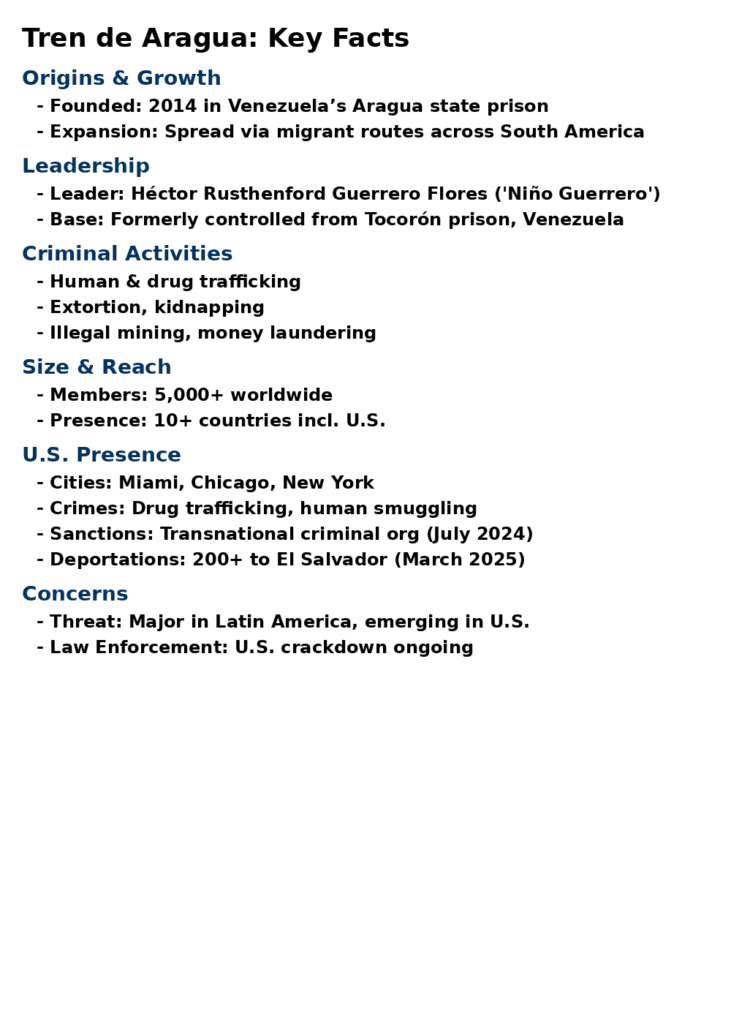The invocation of the Alien Enemies Act of 1798 by President Donald Trump in March 2025 to justify the deportation of alleged members of Venezuela’s Tren de Aragua gang has ignited a constitutional and legal firestorm. The act, one of the oldest laws in the United States still in effect, was originally designed to address wartime national security threats. However, its application in the current situation raises serious legal and ethical concerns, particularly given that the United States has not declared war against Venezuela. The use of El Salvador as a transit point for deportations further complicates the matter, raising significant questions about due process, international law, and executive overreach.
Historical Context of the Alien Enemies Act
The Alien Enemies Act was enacted on July 6, 1798, amid escalating tensions with France during the so-called Quasi-War. It was part of the broader Alien and Sedition Acts, designed to protect national security by giving the president broad powers to detain, relocate, or deport nationals of enemy states during times of war or declared hostilities. Unlike the other Alien and Sedition Acts, which expired or were repealed, the Alien Enemies Act remains in effect today, codified in Title 50 of the U.S. Code (Sections 21–24).
Historically, the Act has been invoked sparingly but with significant consequences. During the War of 1812, President James Madison used it to detain British nationals. During World War I, President Woodrow Wilson applied it to German and Austro-Hungarian nationals. The most infamous use of the Act was during World War II when President Franklin D. Roosevelt authorized the internment of Japanese, German, and Italian nationals following the attack on Pearl Harbor. The internment of Japanese Americans, many of whom were U.S. citizens, is now regarded as a grave injustice, demonstrating the dangers of executive overreach under the guise of national security.
Legal Challenges in the Current Context
Trump’s invocation of the Alien Enemies Act to deport Venezuelans linked to Tren de Aragua is legally dubious for several reasons. First and foremost, the United States has not declared war against Venezuela, nor has it officially designated the country as a hostile state. The Act is explicitly designed for situations where the U.S. is in an active state of war with a foreign power. In this case, no such war exists, making the application of the law highly questionable.
Additionally, the Act applies to “alien enemies,” meaning foreign nationals from a nation with which the U.S. is at war. Even if one were to argue that the gang poses a security threat, members of Tren de Aragua do not constitute a formal military force representing the Venezuelan government. Using the Act in this context stretches its original intent beyond recognition and sets a dangerous precedent for its use in future immigration policies.
Use of El Salvador as a Third Country for Deportation
Another alarming aspect of this policy is the reported use of El Salvador as a transit point for deportations. Rather than deporting individuals directly to Venezuela, the Trump administration transferred them to El Salvador, a country known for its own struggles with gang violence. This raises serious concerns about international law and the rights of the deported individuals.
The principle of non-refoulement, enshrined in international human rights law, prohibits the deportation of individuals to a country where they may face persecution, torture, or inhumane treatment. By circumventing direct deportation and using a third country, the administration risks violating international conventions, including the 1951 Refugee Convention and the Convention Against Torture. Furthermore, El Salvador’s role in this process remains murky—was it coerced into accepting these deportees, or did it willingly participate in this legally dubious scheme?
Given El Salvador’s history of dealing with violent gangs such as MS-13 and Barrio 18, dumping suspected members of Tren de Aragua into its already fragile security environment risks exacerbating regional instability. This move could strain diplomatic relations and create unintended consequences, such as increased violence or human rights abuses in El Salvador.
Due Process and Constitutional Concerns
Perhaps the most concerning aspect of the administration’s actions is the erosion of due process rights. The U.S. Constitution guarantees basic legal protections to all individuals within its jurisdiction, regardless of their immigration status. By invoking an 18th-century wartime law to sidestep standard immigration procedures, the government has created a system where individuals can be detained and deported without the due process typically afforded under U.S. immigration laws.
This move echoes historical instances where national security concerns were used to justify suspending civil liberties, such as the internment of Japanese Americans or the post-9/11 detentions under the Patriot Act. The judiciary has already intervened, with a federal judge temporarily blocking the deportations, citing due process violations. However, the fact that such an attempt was made in the first place raises alarms about the potential for future abuses.
Political Motivations and the Broader Implications
Trump’s use of the Alien Enemies Act cannot be viewed in isolation; it is part of a broader pattern of hardline immigration policies aimed at appealing to his political base. The decision to target Venezuelans is particularly notable given the political dynamics in Florida, where the Venezuelan-American community is a key voting bloc. While some may see this as a crackdown on criminal activity, others view it as a politically motivated maneuver designed to reinforce a tough-on-immigration image.
Moreover, using an antiquated law to justify modern immigration enforcement sets a precedent that could be exploited by future administrations. If the Alien Enemies Act can be used in this context, what is to stop a future president from applying it to other groups deemed undesirable? Could it be used against political dissidents or activists under the guise of national security? The potential for abuse is vast and deeply concerning.
The Need for Legal Reform
The current controversy highlights the urgent need to revisit and possibly repeal the Alien Enemies Act. Laws designed for the 18th century have little place in modern governance, particularly when they are misapplied in ways that undermine constitutional rights. Congress should consider legislative action to clarify the limitations of the Act, ensuring it cannot be used as a blanket justification for deportations in non-war contexts.
In addition to legislative reform, judicial oversight is crucial. Courts must continue to scrutinize executive actions that attempt to exploit outdated laws for contemporary political purposes. The temporary injunction against the administration’s use of the Act is a positive step, but long-term legal clarity is necessary to prevent future misuse.
Back to the Past
The Alien Enemies Act of 1798 was created for a different era, one where war was formally declared and enemies were clearly defined. Its application in 2025, in the absence of a declared war against Venezuela, represents a troubling expansion of executive power. The use of El Salvador as a third country for deportations, the erosion of due process, and the potential violations of international law make this a deeply problematic precedent.
As history has shown, laws intended for national security can quickly become tools for political repression if left unchecked. The U.S. legal system must act decisively to ensure that such abuses do not become the norm. The Alien Enemies Act should not be a backdoor for mass deportations—it should be a relic of the past, not a weapon of the present.















